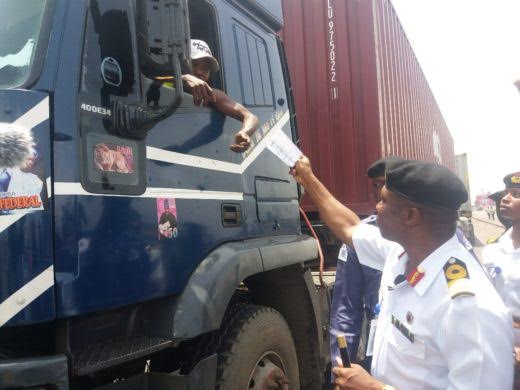
As part of measures to ease the perennial gridlock in Apapa, Lagos, the Nigerian Navy says it has introduced a “call up card system” for trucks that have business to do at the ports. This is even as the Nigerian Ports Authority (NPA) said trucks would no longer be allowed to take empty containers directly to the port.
The Commanding Officer, Nigerian Navy Ship (NNS) BEECROFT, Commodore Okon Eyo, disclosed this to journalists at a news conference at the Naval Base in Apapa, Lagos.
He said the call up card system only allowed trucks that had business inside the ports, while those without call up cards will be turned back at the foot of the bridge.
“What we have done was to a design call up card. Every morning, we ask them to bring the particulars of the trucks and we endorse the cards and give it to them.
“This will distinguish them from those who are not supposed to move, who should wait for normal clearance to proceed.
“This card will be given back to them and this means that we have processed trucks to continue.
“This card has worked perfectly well with the tankers and with this, they have been able to conduct their businesses well,” he said.
He said that the Nigerian Ports Authority (NPA) had also played a major role in easing the traffic situation around the port area.
“We had a meeting and we were able to brainstorm and they have to do more supervision and we all agreed to step up our game,” he said.
Eyo said shipping companies should have a holding bay to reduce the number of trucks carrying containers on the road.
He said the call up system started on March 22.
The Traffic Manager of Lagos Port Complex, Apapa, Victor Ogini, said that there was an existing relationship between the port and the Nigerian Navy.
Ogini also said that trucks are no longer allowed to return empty containers to the nation’s seaports.
According to him, empty containers are henceforth to be delivered directly to shipping companies holding bay.
“With this directive, shipping companies are expected to have holding bays where their empty containers could be kept while waiting to be taken into the terminals,” he said.